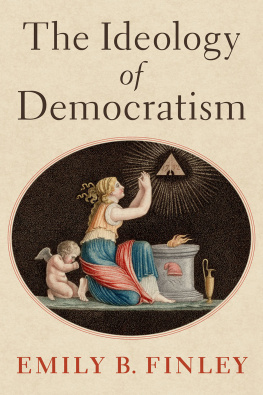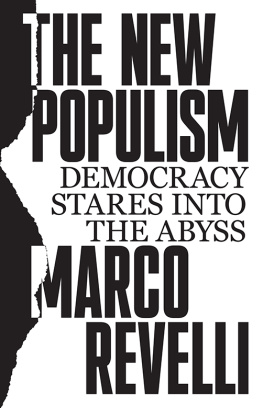The Ideology of Democratism

Oxford University Press is a department of the University of Oxford. It furthers the Universitys objective of excellence in research, scholarship, and education by publishing worldwide. Oxford is a registered trade mark of Oxford University Press in the UK and certain other countries.
Published in the United States of America by Oxford University Press
198 Madison Avenue, New York, NY 10016, United States of America.
Oxford University Press 2022
All rights reserved. No part of this publication may be reproduced, stored in a retrieval system, or transmitted, in any form or by any means, without the prior permission in writing of Oxford University Press, or as expressly permitted by law, by license, or under terms agreed with the appropriate reproduction rights organization. Inquiries concerning reproduction outside the scope of the above should be sent to the Rights Department, Oxford University Press, at the address above.
You must not circulate this work in any other form and you must impose this same condition on any acquirer.
Library of Congress Control Number: 2022939679
ISBN 9780197642290
eISBN 9780197642313
DOI: 10.1093/oso/9780197642290.001.0001
Contents
Is democracy antidemocratic? If you apply the standards of a hugely influential modern understanding of what democracy ought to be, this question is not as paradoxical as it may seem. According to this understanding of popular government, which forms part of a larger view of human nature and society, the practices of actual democracies fall far short of, or egregiously violate, what is considered to be real democracy. This view is not confined to a small minority of theorists, and it is not of recent origin. It has been a powerful and growing influence in America and leading Western European nations and their colonial satellites for a couple of centuries. It has long been prominent in universities and intellectual circles, and it is today more widespread than everso ubiquitous, in fact, that its views are a prominent ingredient in public debate whenever issues of democracy or related issues are raised. This view of democracy informs a wide range of demands for reform that often extend far beyond politics. This understanding of democracy has become something like a new view of life, a replacement for old Western beliefs and practices, and in some instances appears to have taken on a religious dimension. The research behind this book provides overwhelming evidence for the view that a certain imaginative belief in democracy has emerged that has all the earmarks of an entire ideology and that is, moreover, perhaps the dominant political belief system in modern Western society. So compelling is the evidence for this view that it is surprising so few have been aware of this hugely influential ideology and that nobody has undertaken a comprehensive study of its features. It is as if the ideology in question has been assumed by its advocates and many sympathizers to be self-evidently true and that it has, as it were, been able to hide in plain sight.
This book investigates the underpinnings and major thrust of what appears to be yet another political ism. Considering the enormous influence of this belief system, it needs to be examined with care. The name I give this post-Enlightenment understanding of democracy is democratism. While I am not the first to use this term for the phenomenon in question, this book is, to my knowledge, the first attempt to offer a systematic description, analysis, and assessment of the ideology of democratism.
At its core, democratism is a hypothetical or ideal conception of democracy that is only tenuously connected to the actual, historical desires of real popular majorities. Rousseau was a pioneering figure in elaborating a new conception of democracy that theoretically calls for rule by the people but eschews popular sovereignty in practice. Rousseau labels the ideal expression of the popular will the General Will. While Rousseau coined the term and gave it powerful expression in The Social Contract, many others have consciously or unconsciously incorporated this same fundamental concept into their understandings of democracy. Democratism can perhaps best be summed up as the belief that democracy is real or genuine only to the degree that it reflects an idealized conception of the popular will. The president of Freedom House was oriented by this democratist conception of democracy when he declared popular majorities a threat to democracy. How could a popular majority threaten democracy, one might wonder? When democracy morphs conceptually in the imagination from a type of government into an abstract and ahistorical ideal, its historical manifestations may be considered false, not real democracy, or not democratic enough. One of the abiding features of democratism is the belief that true democracy can be accomplished once certain institutional mechanisms are put in place. It is always just over the horizon.
Because the general will is an ideal, a leader or group of leaders must bring it to life practically. Rousseaus Social Contract is, again, paradigmatic. An all-knowing legislator is Rousseaus solution to the seemingly intractable problem of escaping business-as-usual politics. Leading without coercing, omniscient and all-capable, the legislator is the deus ex machina of The Social Contract, setting the new political system in motion. Those who conceive of democracy according to the democratist perspective rely on a legislator in one form or another to midwife a new, truer Democracy into existence. Because of its prima facie commitment to democracy, democratism is often reluctant to acknowledge its dependence on a legislator or vanguard to encourage the right democratic norms. One of the paradoxes of democratism and one of the indicators of its ideological nature is the need for an elite to coax the general willwhatever name it might go byfrom the populace.
Calling for greater power to the people and fewer mediating institutions between the people and government, democratism has every appearance of being highly democratic. Heavy use of abstract concepts from the democratic lexicon has helped democratism largely escape notice as an ideology and as fundamentally antidemocratic. It will likely come as a surprise to many to see notable champions of democracy such as Thomas Jefferson and the school of thought known as deliberative democracy included in this book as examples of an ideology that, to a greater or lesser degree, rejects popular sovereignty. Subtle assumptions about the need to alter inherited norms and cultural practices guide the ostensibly democratic thought of democratists. Careful examination reveals that what may at first seem like reasonable reforms are in fact proposals for dramatic, even revolutionary changes to a peoples social norms and ways of life. Democratism glosses over the ways in which it expects to transform a peoples practices and even psychology, focusing instead on the technical aspects and new procedures. Yet the adoption of the new democratic system is dependent on the people accepting it and practicing it, much more so than on the correct political architectonics, as the history of political revolution and lesser political change reveals.
To what extent is democratisms ideal of democracy connected to actual democracy as a form of government? If it is found to have little in common with our traditional notion of democracy as rule by the people, then it is worth investigating this new conception of rule and asking if it is desirable or legitimate. Part of this will entail asking if democratic idealism is a fruitful way of conceiving democracy, or if such idealism inherently encourages undemocratic, even dangerous political practices. If democratism is not a system that depends on the peoples actual, historical will, then on what does it base its legitimacy? These are questions that this book investigates through a careful examination of this ideologys leading representatives, the democratists.











